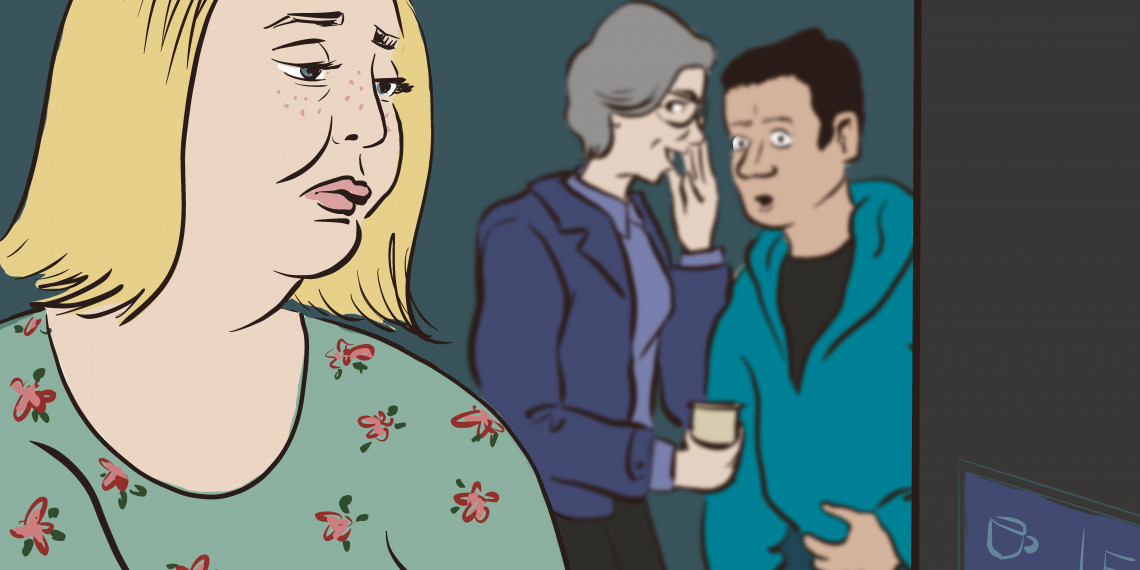Mariska’s story: ‘I became a pariah of sorts and felt excluded’
An unsafe work environment can have disastrous consequences. UT employee Mariska* experienced this first-hand. For 18 years, she has worked for the university as canteen manager, which she always enjoyed doing. ‘I especially liked working with students. You’re responsible for them but it’s also a lot of fun. Students have a different kind of humour and they’re straightforward. They have a slightly different view of things and are inventive. I’ve learned a lot from them.’
However, after a disagreement about financial flows, which pitted her directly against her manager, Mariska notices that something has changed. Consultations and annual performance appraisals became more “vicious”. ‘Suddenly, all kinds of accusations were being thrown my way. Supposedly, the atmosphere in the canteen was not welcoming. There had been complaints about this. I wanted to know who had made them, so that I could talk to them. But because of the GDPR, my manager was supposedly not allowed to tell me. As far as I could see, the aim was not to resolve the situation together; they just wanted to get rid of me. It turned into a labour dispute. I even heard through the grapevine that a successor had already been appointed for my position.’
Excluded
Meanwhile, the atmosphere in the workplace changed. ‘Colleagues would be told off by their managers if they talked to me, so they started to avoid me. I became a pariah of sorts and felt excluded. It wasn’t a concrete thing, but rather something intuitive. Whenever my colleagues wanted to go out for a sausage roll on the terrace, they wouldn’t ask me to come along. I was also no longer invited to farewell receptions, or I was invited far too late. I was no longer a part of the team.’
'I didn’t want to be in a conflict, let alone a legal battle. I’d seen how that had worked out for other colleagues. They were all kicked out.'
After a while, the canteen manager received an offer for a new job within the department. ‘It was a matter of take it or leave it. ‘You don’t have to work here’, I was told. But I didn’t want to stop working as canteen manager and dug in my heels. My father used to run his own business and my mother was a journalist and head of the union. I was taught not to give up easily. That’s why I initially turned down the offer.’
Help within the UT
Mariska starts looking for support within the UT organisation. ‘A confidential adviser would listen to me, but I needed more help. That’s why I turned to the ombudsperson. He told me I was being treated unfairly, and the next step would be to file an official complaint. But then I thought to myself: a complaint? What would happen next? That’s a huge step. I didn’t want to be in a conflict, let alone a legal battle. I’d seen how that had worked out for other colleagues. They were all kicked out.’
She would have preferred an independent “buddy”. Someone who would accompany her to annual performance appraisals, and who had a clear mandate. ‘It’s either a sympathetic ear or acute escalation; the UT offers no middle ground. That’s the real problem. To be honest, I’d expected to receive help from HR, in the form of a mediator for example, who would sit in on the annual performance appraisals. However, I discovered that in conflict situations, HR is only there for the managers, not for the employees.’
No way out
The conflict causes the canteen manager a great deal of stress. ‘I come from the catering industry and I’m not a quitter. But the atmosphere at work really hurt my self-confidence. My hair even started to fall out, purely because of the stress. I also wore down my four front teeth from grinding due to the stress. Yet at the same time, I knew that if I called in sick, it would be used against me. So I felt like I was backed into a corner.’
'In case of conflicts, employees are often left in a vacuum and that’s disheartening. It’s not good for an organisation when managers create a closed and unsafe atmosphere.'
In the end, Mariska decided to cut her losses. She accepts the new job within the department. ‘I knew I wouldn’t be able to win a yes/no battle, but losing my job was very painful for me. And I notice that my colleagues within the department still keep an eye on me. Like: there must be something wrong with her, because where there’s smoke, there’s fire. That’s why I still feel alienated from everything sometimes.’
According to Mariska, her managers’ behaviour was ‘absolutely transgressive’. Nevertheless, she does not consider the UT to be a bad employer. ‘But in case of conflicts, employees are often left in a vacuum and that’s disheartening. It’s not good for an organisation when managers create a closed and unsafe atmosphere. That’s exactly why I’m telling my story. I hope that something positive will come out of it.’
Iris’ story: ‘This could have been prevented with just one conversation’
Iris* has also worked at the university for years. She enjoys working as a project leader at various locations and faculties. She does not know Mariska, but her story is strikingly similar to her own. She says that she has also been subjected to abuse of power by several people in high-level positions, including her manager. And like Mariska, Iris is also no longer employed in the same position, which changed from a dream job into a nightmare a year ago.
Iris has a good relationship with her manager within the department at her faculty. In spring 2021, her manager comes to her with some unpleasant news. She has received multiple complaints about Iris. ‘Complaints about my character. I was accused of being negative, difficult to work with and unwilling to compromise.’
'HR should not have got involved; that was going to cost me my job.'
Iris tries to respond to this news in a professional manner. She is solution-oriented so she would like to talk to the complainants. ‘But they had submitted their complaint anonymously via a messenger, so that was not possible. I had to think of a solution myself, but there was no room for discussion.’
Iris visits the ombuds officer for advice, and later on, HR gets involved as well. However, when her manager learns about this, the seemingly innocent case threatens to escalate. ‘HR should not have got involved; that was going to cost me my job. Eventually, I had to come and talk to the messenger – someone higher up – who then tried to soothe the situation. They’d apparently meant no offence and I should just try to forget about it.’
Physical complaints
But letting it rest is not an option for Iris. There are several people there who have complaints about her, but every time she asks for clarification, the number of complainants changes. Moreover, she trusts her colleagues less and less, because she sees everyone as a potential complainant who has a problem with her. She visits the director of operations, and then the House of Integrity. Through them, she contacts an HR manager and finally, she ends up seeing the university doctor because the situation is causing her extreme stress and physical complaints.
The only thing Iris asks of all these people is to talk to the complainants. If there even are any, because later on, she finds out that no complaints have been made at all. ‘I suspect that it was a premeditated plan to keep me quiet or to get rid of me. Once, during a meeting, I was the only one who said “no”; I had my own professional reasons for doing so. I stand up for my interests and do not simply give the answer they want to hear, as is appropriate in an academic environment. This only goes to show that they just want bootlickers and yes-men at this faculty. They don’t want you to think outside the box and go the extra mile.’
'I started to question everyone and the people around me drew away from me. My manager even threatened to file a complaint against me if I kept going.'
Iris backs up this statement with a striking example. The job vacancy she applied for asked for a proactive attitude. ‘After my departure, when the position was open again, they no longer asked for a proactive attitude in the job vacancy.’
Iris has nothing good to say about her departure from the department. With a heavy heart, she exchanges her job for another position within the university. ‘But there was no other way. I started to question everyone and the people around me drew away from me. My manager even threatened to file a complaint against me if I kept going. It was no longer a safe place for me to work.’
Victim’s perspective
Because a report to the Executive Board also fails to bring about any reflection or truth for Iris, she files an official complaint concerning transgressive behaviour. A court hearing and a decision are still to follow. The fact that she has to take it to such extremes pains her. ‘This could have been prevented with just one conversation, then there would have been no problem. The UT boasts of its broad support structure. And in theory, all the right service points are in place, but not once did I get asked how things could be solved for me. What does HR do? That service is supposed to be there for the employees. But nobody is willing to look at things from the victim’s perspective. I was so happy with my job; I never wanted this, and now, after almost a year of fighting, I have to file an official complaint to denounce the case.’
Despite the fact that this soap opera keeps replaying in her head, the project leader is feeling good about her new workplace. Her main concern is to ensure that other UT employees will not have to deal with similar experiences. According to her, the first step is to limit managers’ power. ‘And invite departing employees for an exit interview. This happens at random now. We also need a protocol for anonymous complaints. If you have a complaint, you should provide examples and evidence. The aim should always be to solve a problem rather than make it worse. And always let an independent person – not the ombuds officer in my case – evaluate a conflict. Because, although I’m gone now, I can see it happening again at the faculty in question.’
'Cases at UT are not unique'
Agnes Akkerman is a professor of Regulation of Labour at the University of Amsterdam. She is an expert in the field of labour relations and can provide a more general picture alongside the specific UT cases. Akkerman refers to a survey she conducted among employees of various companies and organisations about reporting problems to managers. 'Our surveys show that 70 percent of employees discuss problems, such as work pressure or intimidation, with their managers. In most cases, the manager offered help, but for more than a quarter of those questioned, problems were brushed aside or no listening ear was offered. This meant that employees no longer felt supported.'
It is not unusual for immediate colleagues to take sides with the manager when problems are raised, Akkerman knows. 'This can create a feeling of isolation. In a way, employees find it logical that a manager looks after the employer's interests, but the lack of support from colleagues makes a big impression. People feel abandoned ('they act like I'm crazy') and this creates a feeling of loneliness, which has a negative effect on job satisfaction and general well-being. The cases at UT are not unique in this.'
Akkerman also recognises the statement that 'HR is there for the managers'. 'HR staff are not independent or impartial. I'm not saying it reproachfully, but they represent the interests of the employer. And employers and employees have opposing interests.' Employees are therefore better off turning to the trade unions or a lawyer, the professor argues. 'I would always opt for 'own' troops. In the end, it comes down to who pays, who decides. With that, the problem or conflict is not immediately legalised. Trade unions and lawyers can give advice and make clear what rights an employee has.'
At the same time, Akkerman understands that UT employees decided to move to a new workplace within the organisation. 'I have not measured it, so it is a bit of a gut feeling, but I presume that the lowest in the hierarchy often loses out. You saw it in intimidation stories about professors that made the papers. It often takes a very long time before a supervisor is finally called to account. When working relationships are disrupted, employees weigh up the options and I can well imagine that. There is more to life than being proved right.'
* The names of the employees in this article are fictitious.
Illustration by Enith Vlooswijk.







